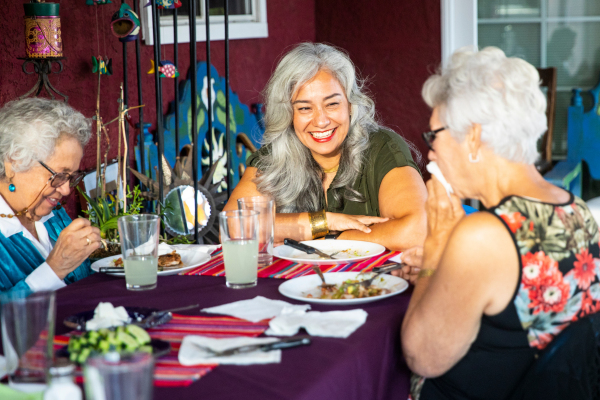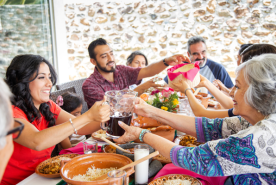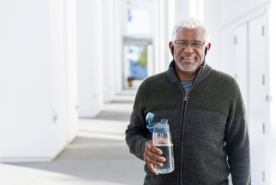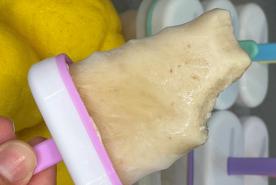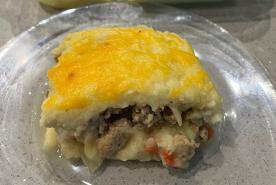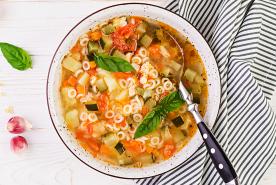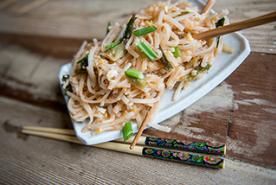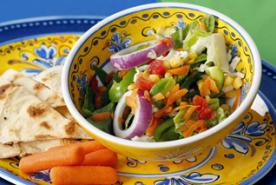March 01, 2025
Perder peso cuando se tiene enfermedad renal puede ser un proceso desafiante. Con tantas dietas populares disponibles —como las desintoxicaciones con jugos, el ayuno intermitente o la dieta de la sopa de col— es natural preguntarse si son seguras o eficaces.
Amanda Hayes, dietista especializada en salud renal, y Jane Demise, paciente con enfermedad renal crónica en etapa 5, explican los riesgos de seguir dietas de moda y los beneficios de una alimentación basada en evidencia para proteger la función renal.
¿Qué diferencia hay entre una dieta de moda y una dieta recetada?
Una dieta de moda suele prometer resultados rápidos.
“Las dietas de moda comparten 'trucos secretos' para perder peso”, explicó Hayes. “Tienden a ser restrictivas, eliminan grupos enteros de alimentos y promueven ingredientes como si fueran curas mágicas”.
En contraste, una dieta recetada está diseñada por un profesional de la salud para ayudar a controlar condiciones específicas como la insuficiencia renal.
“Una persona con enfermedad renal en etapa avanzada puede necesitar reducir el sodio. Otra que está en diálisis peritoneal o hemodiálisis necesita una dieta más alta en proteínas”, comentó Hayes. “Estas dietas no son soluciones rápidas, sino parte del tratamiento a largo plazo para proteger los riñones”.
Ejemplos de dietas recetadas para pacientes renales
- Dieta mediterránea: rica en cereales, vegetales, frutas, frijoles, aceite de oliva y pescado.
- Dieta DASH: recomendada para quienes necesitan consejos para controlar la presión arterial. Baja en sodio, azúcares y grasas saturadas.
- Dieta MIND: combinación de las anteriores, prioriza la salud cerebral con verduras de hoja verde, bayas, frutos secos y pescado.
¿Buscas más información?
Únete a nuestra comunidad
Mantente conectado y accede a recursos adicionales relacionados con la enfermedad renal.
¿Son peligrosas las dietas de moda para quienes tienen enfermedad renal?
Sí. Estas dietas pueden poner en riesgo la salud nutricional y acelerar el deterioro renal.
“Las personas con enfermedad renal son más vulnerables a la desnutrición. Limitar un grupo alimenticio puede restringir nutrientes esenciales”, explicó Hayes. “Además, la pérdida o el aumento extremo de peso en pacientes en etapas 3 a 5 de la enfermedad renal crónica se asocia con una progresión más rápida hacia la diálisis”.
Las dietas altas en proteína como la paleolítica o Atkins, y planes restrictivos como la dieta de la sopa de col, pueden causar niveles altos de potasio o empeorar la función renal.
“Comía sopa de col dos veces al día y una comida regular. No me ayudó a bajar de peso y tenía alto contenido de sodio”, dijo Jane. “Con el tiempo, esas dietas de moda arruinaron mi metabolismo”.
El cambio hacia una dieta renal recetada
En 2017, Jane ya estaba en etapa 4 de la enfermedad renal. Buscó ayuda profesional y consultó a un dietista especializado en enfermedad renal.
“Me dijeron que estaba cerca de la desnutrición porque estaba limitando los alimentos equivocados. Mi dietista me evaluó de manera integral y diseñó un plan que me permitió bajar de peso y cuidar mis riñones al mismo tiempo”.
Después de un año, Jane había perdido 50 libras (22 kg) y había evitado ingresar a diálisis.
“Antes, hacía dietas por culpa. Esta vez, cambié mi estilo de vida para sentirme bien y estar saludable. Por eso funcionó”, dijo Jane. “Creo que esta forma de vivir es la razón por la que he evitado la diálisis durante tanto tiempo”.
Mentalidad, motivación y alimentación positiva
“¿Está haciendo estos cambios porque se valora y quiere cuidarse, o por culpa?”, preguntó Hayes. “La vergüenza no genera cambios sostenibles. Lo que sí lo hace son los pequeños ajustes, la consistencia y la flexibilidad”.
Además, no se trata solo de evitar alimentos:
“Una dieta para pacientes renales también consiste en agregar alimentos saludables, especialmente de origen vegetal”, afirmó Hayes. “En lugar de enfocarse en lo que no puede comer, concéntrese en lo que sí puede incluir para mejorar su salud y mantener el placer por la comida”.
Encuentre recetas buenas para la enfermedad del riñón o superalimentos que puede añadir a su plato.
Dietas y enfermedad renal
| Aspecto | Dieta de moda | Dieta recetada por profesional |
|---|---|---|
| Objetivo | Pérdida de peso rápida | Apoyar la salud renal a largo plazo |
| Diseñada por | No profesionales; popularizada por redes sociales o celebridades | Médicos, dietistas especializados en riñón |
| Riesgos comunes | Deficiencias nutricionales, metabolismo alterado, empeoramiento de la enfermedad renal | Pocos, si está bien ajustada a cada etapa y necesidad del paciente |
| Ejemplos comunes | Dieta de la sopa de col, ayuno intermitente, dieta keto o Atkins | Dieta DASH, mediterránea, MIND |
| Apta para enfermedad renal | ❌ No recomendada para etapas 3–5 de ERC ni en pacientes con tratamiento renal | ✅ Se adapta al tipo de paciente: en diálisis, sin diálisis o con condiciones como hipertensión |
| Resultados esperados | Corto plazo, muchas veces insostenible | Mejora de función renal, peso saludable, prevención de complicaciones |
¿Tiene preguntas sobre nutrición y salud renal?
Nuestro equipo de NKF Cares está aquí para ayudarle en el proceso:
- Llame al 855.NKF.CARES (855.653.2273)
- Envíe un correo a nkfcares@kidney.org
